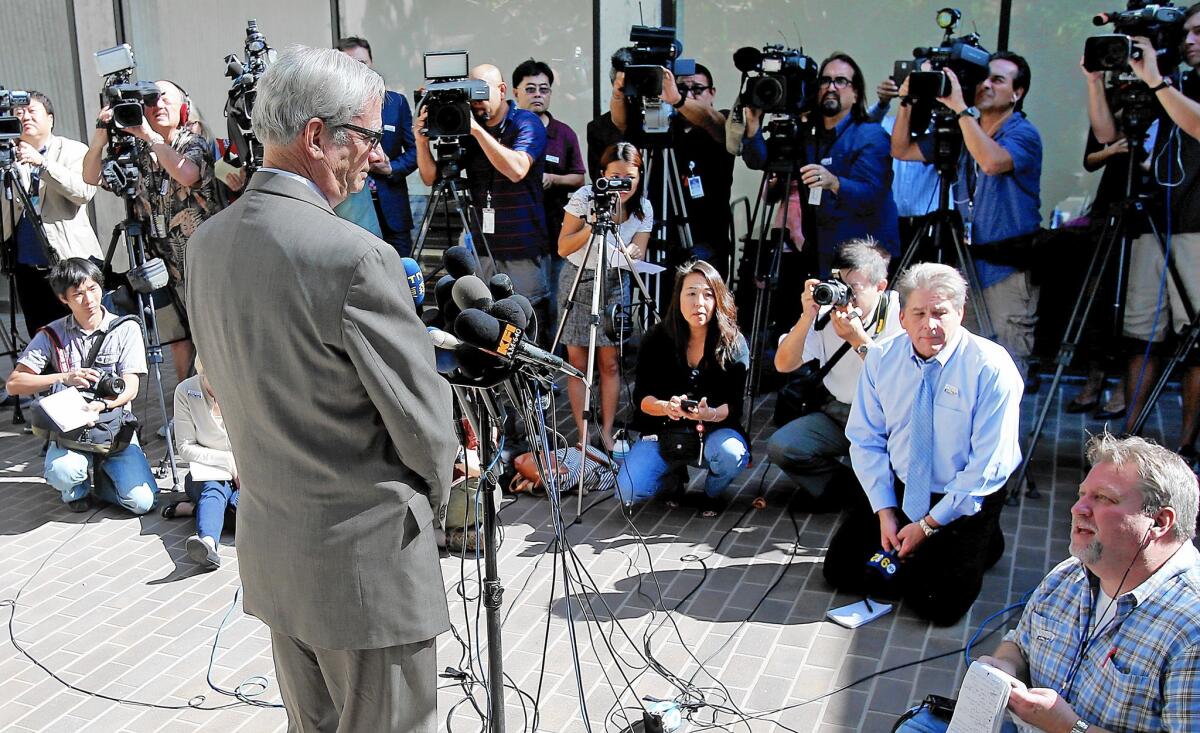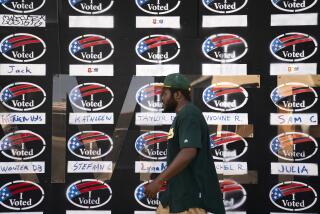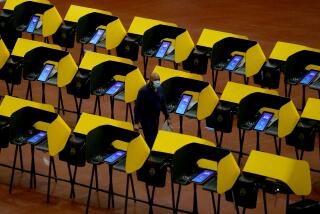Most voters not worried about Ebola threat in California

Despite an onslaught of news bulletins and some missteps in the nation’s response, a majority of California voters are unfazed by the Ebola threat and confident government officials and medical workers are prepared to handle outbreaks, a new USC Dornsife/Los Angeles Times poll has found.
Nearly 70% of respondents in the statewide survey indicated they weren’t particularly concerned about encountering the deadly virus.
Thirty percent of registered voters said they were very or somewhat worried that they or someone in their family would be exposed to the virus. Those fears were most pronounced among Latinos, nearly half of whom said they were at least somewhat worried about Ebola exposure, the poll found.
At the same time, more than half of all respondents said they had a great deal or a fair amount of confidence that local, state and federal officials will be able to deal with Ebola, with nearly 70% expressing similar faith in local hospitals and doctors.
“Ebola definitely could happen here,” said Glenn Partridge, a 46-year-old Democrat from Santa Clarita who said she wasn’t especially concerned about the virus. “But I’m not worried about it to the extent that it will be an epidemic. I think they would quickly isolate the patient and it would be eradicated pretty fast.”
The poll surveyed 1,537 registered voters as the U.S. and California were ramping up their responses to an epidemic that according to the World Health Organization has infected more than 13,000 people and killed close to 5,000 as of Oct. 27.
The first case in this country was confirmed on Sept. 30, when Liberian national Thomas Eric Duncan was diagnosed in a Dallas hospital. Two Texas nurses subsequently contracted the virus while treating Duncan, who died on Oct. 8. A New York doctor also has been diagnosed with Ebola after returning from working with patients in Guinea.
While there were no suspected or confirmed cases of Ebola in California as of Thursday, there have been several widely publicized scares. Some voters said sensationalized media coverage has stoked unnecessary panic.
“This is a horrible disease that we are just not going to get,” said Jonathan Reilly, a 42-year-old Democrat from Reseda. “If anything, people are over-prepared and overreacting in ways I find almost comical.”
Reilly noted that the virus is only contagious when symptoms are present and that hospitals know to pay close attention to sick patients who might have traveled to Ebola hot zones.
Michelle Stauffer, 60, an independent voter from Wawona, wondered why more attention wasn’t paid to chronic illnesses that affect larger numbers of people, such as cardiovascular disease.
“One person died,” she said. “When you’re sitting on the other side of the U.S. … it’s like, wait a minute, let’s stand back and look at this.”
Several weeks after the arrival of Ebola in the U.S., California voters have a lot of “psychological distance” from the virus, said Dan Schnur, executive director of USC’s Jesse M. Unruh Institute of Politics.
“Dallas is more than 1,000 miles away, and New York and New Jersey are around 3,000 miles away,” he said, referring to the U.S. locations where Ebola cases have been of the greatest public concern.
Schnur said he thought original levels of worry about Ebola had begun to subside and voter confidence had begun to rise by the time the poll was conducted, from Oct. 22 to Oct. 29.
Some respondents anxious about exposure to Ebola said they suspected the virus might be passed along more easily than medical experts claim.
“I believe that this thing has mutated. It’s airborne,” said 60-year-old Eva Jennings, of Yucca Valley, an independent voter. She said she was very worried about Ebola and predicted “mad panic and chaos” when the virus arrives.
Concerns about Ebola were greatest among Latino voters, with 48% reporting they were very or somewhat distressed about being exposed to the virus. That was twice the rate of white voters.
“I’m really worried about Ebola,” said Los Angeles resident Juan Rios Negrete, 49. “If people get it like a flu, it’s going to be unstoppable.”
Covina resident James Renteria, who works at a golf store, said he switched his customary greeting from handshaking to fist-bumping to avoid germs. “I work with the public and it seems to me anything can be passed around,” he said.
Renteria, 68 and a Democrat, said more should be done to track travelers and medical workers returning from West Africa.
Despite stronger concerns about exposure to Ebola, Latinos, like other groups of respondents, expressed high levels of confidence in the government’s ability to manage outbreaks.
Among Latinos, “there’s greater concern about its spread than about our ability to contain it,” said GOP political consultant Mike Madrid.
Overall, foreign-born voters were more likely to be worried about Ebola than U.S.-born respondents, and college-educated voters were less likely to be concerned than those with no college experience. Thirty-five percent of women reported being at least somewhat worried about Ebola exposure, compared with 24% of men.
The bipartisan USC Dornsife College of Letters, Arts and Sciences and Los Angeles Times poll was conducted by Greenberg Quinlan Rosner, a Democratic firm, and American Viewpoint, a Republican company. The margin of error is plus or minus 2.9 percentage points.
[email protected]
Twitter: @LATerynbrown
More to Read
Sign up for Essential California
The most important California stories and recommendations in your inbox every morning.
You may occasionally receive promotional content from the Los Angeles Times.











